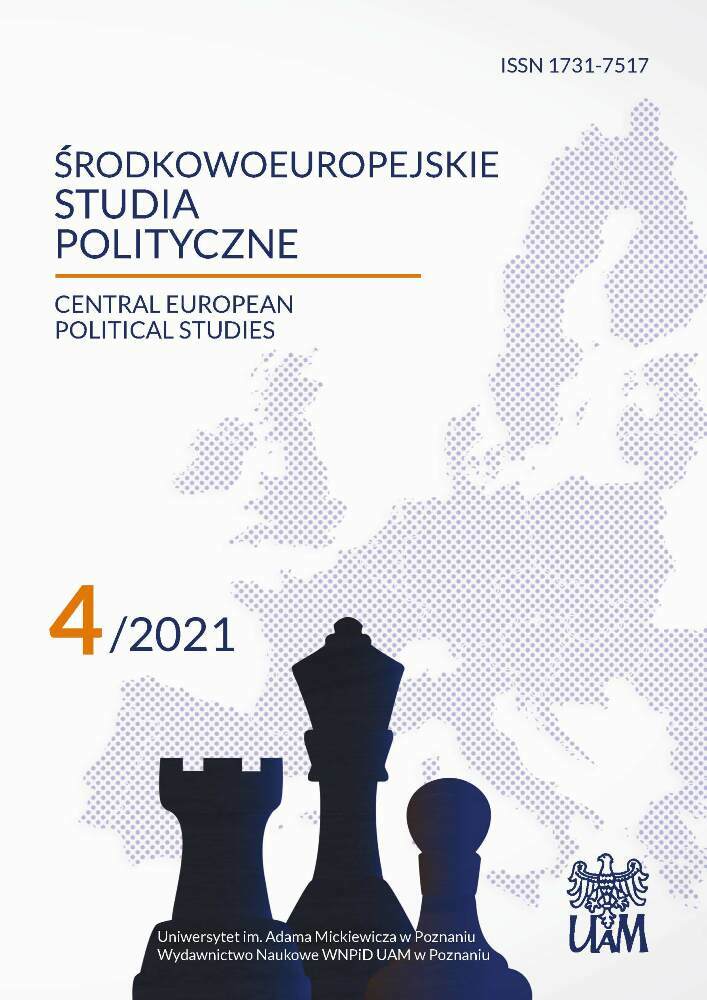Abstract
At the beginning of 2020, the world faced a new and unexpected challenge. Such a harmful situation has a potential to increase tensions in societies and create citizens’ distrust in their own governments and the European Union. In relation to these observations, the main hypothesis assumes that citizens’ trust in the Union decreased during the pandemic, compared to previous periods. Thus, the aim of the study is to identify the dynamics of trust in the EU in the member states. The research’s object is the citizens of the EU member states and the focus on dynamics in the levels of trust in 2016–2020, measured based on selected indicators. The data for analysis comes from the Eurobarometer. Statistical methods (frequencies and cross tables) and comparative approach are used for the analysis. On the macrolevel, it seemed that European leaders could do better, especially in the initial stages of the COVID-19 pandemic. However, the results of the Eurobarometer survey performed in the summer of 2020 show that average trust in the Union did not decreased. Тhe data shows that there is a variety across the countries, which was not presented in the current study. Thus, a further examination focused on the context in each of the countries is required, namely policies and measures stringency.
References
Aksoy C. G., Cabrales A., Dolls M., Windsteiger L. (2020), COVID-19, trust and solidarity in the EU, EconPol Policy Report, no. 27, ifo Institute – Leibniz Institute for Economic Research at the University of Munich, Munich, http://hdl.handle.net/10419/233530.
Almond G., Verba S. (1989), The Civic Culture: Political Attitudes and Democracy in Five Nations, SAGE, Thousand Oaks.
Bargain O., Aminjonov U. (2020), Trust and compliance to public health policies in times of COVID-19, “Journal of Public Economics”, vol. 192, https://doi.org/10.1016/j.jpubeco.2020.104316.
Blagoeva Bl. (2014), Political culture and political socialization, in: Fundamentals of political sociology, ed. D. Naneva, UI “Paisii Hilendarski”, Plovdiv.
Brendebach J., Poiares Pessoa Maduro L. M., Tassinari F. (2020), The EU response to the COVID-19 pandemic: achieving relevance, mobilising solidarity and preparing for the future, STG Policy Briefs, http://hdl.handle.net/1814/66789.
Deutsche Welle (2020), Angela Merkel says EU leaders’ remain apart’ on coronavirus recovery deal, 13.07.2020, https://www.dw.com/en/merkel-eu-recovery-deal/a-54164187.
Devine D., Gaskell J., Jennings W., Stoker J. (2021), Trust and the Coronavirus Pandemic: What are the Consequences of and for Trust? An Early Review of the Literature, “Political Studies Review”, vol. 19, no. 2, doi: 10.1177/1478929920948684.
Dodsworth S., Cheeseman N. (2020), Political trust: The glue that keeps democracies together, Westminster Foundation for Democracy, London, https://www.agora-parl.org/sites/default/files/agora-documents/Political%20trust%20-%20The%20glue%20that%20keeps%20democracies%20together.pdf.
Eurofound (2021), Living, working and COVID-19 (Update April 2021): Mental health and trust decline across EU as pandemic enters another year, Publications Office of the European Union, Luxembourg, doi:10.2806/76802.
European Commission, Brussels (2017), Eurobarometer 87.3 (2017), GESIS data archive, Cologne. ZA6863 data file version 1.0.0, https://doi.org/10.4232/1.12847.
European Commission, Brussels (2018), Eurobarometer 89.1 (2018), GESIS data archive, Cologne. ZA6963 data file version 1.0.0, https://doi.org/10.4232/1.13154.
European Commission, Brussels (2019), Eurobarometer 91.2 (2019), GESIS data archive, Cologne. ZA7562 data file version 1.0.0, https://doi.org/10.4232/1.13318.
European Commission, Brussels (2020), Eurobarometer 85.2 (2016), GESIS data archive, Cologne. ZA6694 data file version 2.0.0, https://doi.org/10.4232/1.13438.
European Commission, Brussels (2021), Eurobarometer 93.1 (2020), GESIS data archive, Cologne. ZA7649 data file version 1.1.0, https://doi.org/10.4232/1.13696.
European Council (2021), Special European Council, 17–21 July 2020, https://www.consilium.europa.eu/en/meetings/european-council/2020/07/17-21/.
Herszenhorn D. M., Paun C., Deutsch J. (2020), Europe fails to help Italy in coronavirus fight, “Politico”, March 5, 2020, https://www.politico.eu/article/eu-aims-better-control-coronavirus-responses/.
Khemani S. (2020), An Opportunity to Build Legitimacy and Trust in Public Institutions in the Time of COVID-19, World Bank, Washington, DC, https://openknowledge.worldbank.org/handle/10986/33715 License: CC BY 3.0 IGO.
Marien S., Hooghe M. (2011), Does political trust matter? An empirical investigation into the relation between political trust and support for law compliance, “European Journal of Political Research”, vol. 50, doi: 10.1111/j.1475-6765.2010.01930.x.
Oksanen A., Kaakinen M., Latikka R., Savolainen I., Savela N., Koivula A. (2020), Regulation and Trust: 3-Month Follow-up Study on COVID-19 Mortality in 25 European Countries, “JMIR Public Health Surveill”, vol. 6, no. 2, doi: 10.2196/19218.
Ortenzi F., Albanse E., Fadda M. (2020), A Transdisciplinary Analysis of COVID-19 in Italy: The Most Affected Country in Europe, “Int. J. Environ. Res. Public Health”, vol. 17, no. 24, https://doi.org/10.3390/ijerph17249488.
Sabat I., Neuman-Böhme S., Varghese N. E., Barros P. P., Brouwer W., van Exel J., Schreyögg J., Stargardt T. (2020), United but divided: Policy responses and people’s perceptions in the EU during the COVID-19 outbreak, “Health Policy”, vol. 124, no. 9, https://doi.org/10.1016/j.healthpol.2020.06.009.
Schraff D. (2020), Political trust during the Covid-19 pandemic: Rally around the flag or lockdown effects?, “European Journal of Political Research”, https://doi.org/10.1111/1475-6765.12425.
Shi T. (2001), Cultural Values and Political Trust: A Comparison of the People’s Republic of China and Taiwan, “Comparative Politics”, vol. 33, no. 4, doi:10.2307/422441.
Yang H. wen (2021) Comparing the Political Trust and Civic Political Culture of Democracy or Authoritarian in Asian Countries, “International Journal of Research –GRANTHAALAYAH”, vol. 9, no. 2, doi: 10.29121/granthaalayah.v9.i2.2021.3491.
License
Copyright (c) 2021 Daniela Pastarmadzhieva, Mina Angelova

This work is licensed under a Creative Commons Attribution 4.0 International License.

